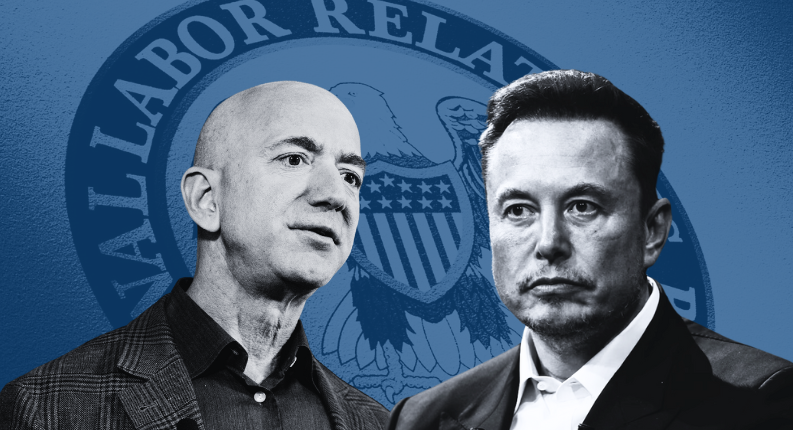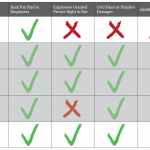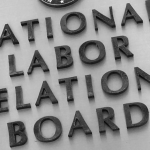Neither Free Nor Fair: The Subversion of Democracy Under NLRB Elections contrasts what NLRB elections look like in the real world with what happens in elections for public office.
By Gordon Lafer, Ph.D.
American Rights at Work
July 2007
Executive Summary (PDF: 4 pages, 77KB) Full Report (PDF: 72 pages, 733 KB)
Read the related press release (PDF: 2 pages, 320 KB)
Executive Summary
From its inception in 1935, the National Labor Relations Act (NLRA) held out the promise that Americans may enjoy democratic rights in the workplace similar to those we count on as citizens. When the bill was passed, the U.S. Senate explained that its purpose was to guarantee rights to “a worker in the field of industry” similar to those provided to “a citizen in the field of government.”
Unfortunately, however, in the 70 years since the law was established, Americans’ democratic right to represent themselves through a union has increasingly become a right that exists on paper only, as aggressive employers and ineffective laws have effectively denied most employees the ability to exercise this right in practice. Over the years, the National Labor Relations Board (NLRB) has interpreted the law in ways that allow employers to deny free speech in the workplace, pervert the political process, and intimidate workers who are voting on the question of unionization. Many forms of employer intimidation that are banned in elections to public office are permitted in NLRB elections. Furthermore, since the penalties for violating labor law are so minimal, it has become commonplace for employers to break the law as part of their efforts to prevent employees from forming unions; thousands of Americans every year are either fired, suspended, or otherwise financially punished for backing the “wrong side” in union elections.
In new research, University of Oregon professor Gordon Lafer, Ph.D., lays bare the realities of how workers’ rights to democratic process and freedom of association have been effectively eliminated under the NLRB system, exposing the myriad ways in which workers are denied the most basic tenets of democracy. This research illustrates just how far NLRB elections fall short of the standards that we rely on in elections to Congress and other public offices. Finally, this report addresses head-on the claim that the NLRB election process guarantees workers a truly secret ballot – the central claim of anti-union advocates who seek to keep the current NLRB system in place. Lafer’s work shows instead that NLRB elections fail to safeguard workers’ right to keep their opinions private; and that, on the contrary, the NLRB system results in workers being forced to reveal their political preferences long before they step into the voting booth – thus turning the “secret ballot” into a mockery of democratic process.
Employers’ Foremost Goal: No Elections at All
In presentations to Congress, business lobbies have sometimes argued that the NLRB system is critical to maintaining workers’ democratic right to a secret ballot election. But in their own internal publications, employer organizations routinely promote a strategy of “union avoidance,” which aims above all to prevent workers from ever having a vote of any kind related to forming a union. The near-universal mantra of management consultants is “You can’t lose an election that never takes place.” Or, as attorneys from the celebrated labor law firm Jackson Lewis advise, “winning an NLRB election undoubtedly is an achievement; a greater achievement is not having one at all!”
“Union avoidance” consultants – employed by a majority of large- and medium-sized employers facing the prospect of a union election – counsel employers to conduct an aggressive, intimidating offensive as soon as any workers begin discussing unionization. Since an NLRB election is held only after 30 percent of employees sign cards calling for a vote, employers’ foremost strategy is to prevent emlpoyees from signing cards that would trigger an election. The thousands of efforts to form unions that have been defeated through such intimidation tactics don’t show up in any government statistics, because employees are scared into silence before any election can be scheduled. But in weighing the arguments of “union avoidance” proponents, it is critical to understand that these are aimed not at safeguarding anyone’s democratic rights, but in guaranteeing that workers never have the right to democratic self-representation.
NLRB Elections: A Model for Authoritarian Regimes Abroad
This report describes what has become standard employer practice in response to workers’ desire to represent themselves through a union. The pages that follow detail the myriad strategies – both legal and illegal – that typically comprise employers’ efforts to deny their workers’ the right to collective bargaining. Many of these entail practices that our government routinely denounces when practiced by foreign regimes. But they have become commonplace in the American workplace. Among the most disturbing of these practices are:
Denial of free speech
At the heart of American democracy is the principle that both voters and candidates must be guaranteed the right to free speech, including equal access to information from all sides of a political debate. But this most fundamental principle is ignored by the NLRB. While management is permitted to plaster the workplace with anti-union posters, leaflets, and banners, pro-union employees are prohibited from doing likewise. Union organizers are banned from ever entering the workplace – or even publicly-used but company-owned spaces such as parking lots – at any time, for any reason. Employees of the company are banned from talking about forming a union while they are on work time, and are banned from distributing pro-union information except when they are both on break time and in a break room. Management consultants typically advise employers on how to maximize the impact of these one-sided advantages, resulting in an election environment that more closely resembles the sham “elections” of one-party states than anything we would call American democracy.
Economic coercion and intimidation
When employers speak out, employees always listen carefully for even the subtlest hints as to what kind of behavior will be rewarded or punished. This is all the more true in an economy where so many Americans feel insecure about their economic future. For this reason, federal election law maintains a blanket prohibition on private companies telling their employees which candidate they should support. Even making more nuanced statements – such as suggestions that if one party or the other triumphs, business may suffer and workers may have to be laid off – is illegal under federal law.
However, under standard “union avoidance” strategy, supervisors are forced, on pain of termination, to engage each of the people under them in intimidating one-on-one anti-union conversations. Workers commonly report illegal threats being made in these meetings, since there are no witnesses present.
But even without illegal threats, supervisor one-on-one meetings undermine democracy. In these conversations, the person who has the most immediate control over your hiring and firing, promotion or demotion, scheduling, duties, hours, and all other aspects of your work life, explains why they believe so strongly that a union would be destructive to the workplace.
Because such conversations are inherently coercive, they are completely banned in elections to Congress or the President. But what is prohibited in federal elections is standard practice under the NLRB and at the heart of employer’s anti-union campaigns.
Ostracism and defamation of union supporters
The NLRB allows employers to make almost any type of threatening or derogatory statement to employees, as long as it doesn’t contain an explicit quid pro quo threat. Workers who have earned their way to good standing with the company are often ostracized and belittled by management after publicly asserting their support for the union. In one example, a worker was followed to restaurants on days off by security guards with walkie-talkies. A member of management was assigned to work with her eight hours a day, five days a week, and was told he was there solely to work on her to change her ideas about unions. She was timed going to the bathroom. Other employers have referred to pro-union employees as “the enemy within,” publicly questioned their personal morality, or isolated them with heavy-handed and heavily-visible security forces. If we imagine a workplace where all Democrats or all Republicans were singled out for such treatment, we would correctly view such tactics as un-American.
There is no such thing as a secret ballot under NLRB elections
Much has been made about the importance of the secret ballot in NLRB elections. But, as this report documents, the NLRB safeguards the secret ballot in name only. The principle of the secret ballot in the American democratic tradition encompasses more than the fact of casting one’s ballot in a private booth on election day. More broadly, it is the principle that voters have the right to keep their political opinions to themselves, and that they cannot be forced to reveal which party they’re supporting before, during or after election day.
But this principle has been eviscerated by the NLRB. Federal law allows anti-union managers to force individual employees into repeated, intimidating one-on-one conversations with their personal supervisors that are designed to make employees reveal their political leanings long before election day. “Union avoidance” consultants typically script supervisors’ conversations, train them how to read employees verbal and non-verbal reactions, and have them ask indirect questions without explicitly asking employees how they will vote. Supervisors often adopt a sophisticated grading system to mark the political tendencies of each of their subordinates; for those whose leanings are unclear, consultants require that supervisors go back for repeated conversations until employees’ political sentiments have been flushed to the surface. Unlike political elections, employee voters have no right to walk away from such conversations or to insist that they don’t want to discuss union-related issues with their supervisor. They can be forced to engage in such conversations daily, or multiple times a day, in an atmosphere of dramatically increasing pressure.
Unsurprisingly, all but the most skilled actors end up revealing their union preferences in these conversations with supervisors. One management consultant recalls that he would commonly initiate a pool among managers, in which each supervisor would predict the number of anti-union votes, with a $100 prize for the closest guess. “It was amazing,” he reports. “In pool after pool the supervisors were astonishingly accurate.”
To the extent that such tactics are effective, the technically secret ballot has ceased to provide any meaningful protection to voters subject to the intense scrutiny of those who control their work lives.
Lack of meaningful enforcement results in pervasive lawlessness
Because labor law lacks any punitive sanctions – no fines, no loss of license, no possibility of prison time – employers are free to break the law with near-total impunity. Over the period of 2000-05, there were an average of just over 19,000 charges filed per year alleging employer violations of federal labor law; of these, 40% – or 8,500 cases per year – presented sufficiently strong evidence that the Labor Board either issued a complaint or oversaw an informal settlement between the parties (NLRB complaints are the equivalent of criminal indictments, and both complaints and settlements represent cases in which the Board judges a charge to have merit). While both unions and employers violate the law, the vast majority of charges stem from employer behavior. In 2004, for example, 88.5 percent of all complaints issued by the Board, and over 90 percent of all cases tried in hearings of the full Board, addressed illegal behavior by employers. The most egregious form of illegal behavior is the firing, suspension, or demotion of employees. On average over the past 10 years, nearly 23,000 workers per year received backpay from employers after accusing them of violating labor law – and this only includes the cases adjudicated to the point that employers were forced to provide backpay to their victims.
While the regularity with which pro-union employees suffer financial punishment is shocking, it is often only the tip of the iceberg of illegal employer behavior. Much of this employer behavior remains hidden from legal authorities. But a glimpse into such practices was provided in 2004, when a South Carolina manufacturer sued Jackson Lewis – one of the country’s preeminent labor law firms – for advising illegal tactics in “a relentless and unlawful campaign to oust the union.” These included spying on workers, firing union activists, organizing a bogus “employee” anti-union committee, writing supposedly employee-authored fliers calling union activists “trailer trash” and “dog woman,” and supplying cash-filled envelopes to anti-union employees. What was unusual about this case is not the tactics employed, but simply that the internal tension between the company and its attorneys led to a public record of management’s tactics.
Conclusion
The NLRB election system has come to be defined by intimidating, coercive, and undemocratic employer behavior – both legal and illegal. Current federal law fails to protect the rights that the U.S. Congress thought it had bestowed to workers more than 70 years ago. If we’re serious about having a truly democratic process for American workers, we must guarantee that workers have access to a fair electoral system, and that must begin by amending existing federal law. Passage of the Employee Free Choice is critical to addressing these failures.





